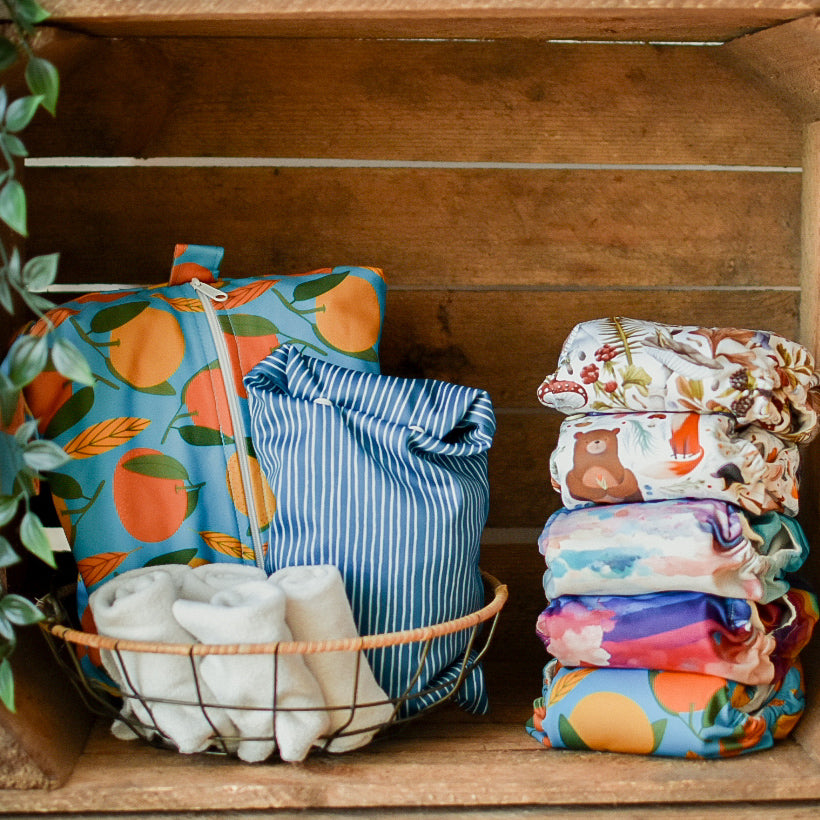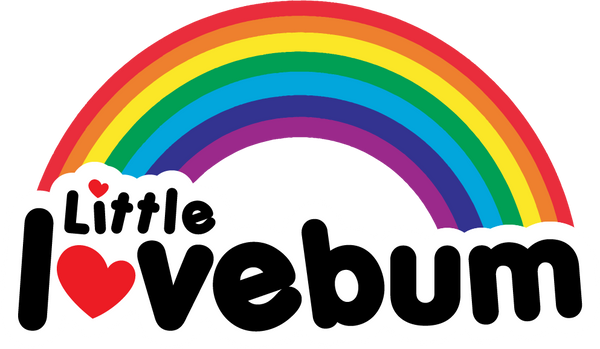New to Cloth - Newborn Starter Kit
New to Cloth - Newborn Starter Kit
Couldn't load pickup availability
Our Newborn cloth nappy Starter Pack has everything you need to start your journey towards a more sustainable and natural approach to baby care. This Kit is a great introduction to using cloth nappies from newborn.
This Kit includes:
5x Newbie Naturals (3-7 kgs)
1x Small Pod
5x Wipes
1x Wipes Pouch
1x Getting Started with Cloth nappies Guide
Once you find your groove, add to your cloth nappy stash, as you will need approximately 30 newborn nappies to cloth full-time.
Need help with some of these words?
Need help with some of these words?
All-In-One (AIO) nappy: The absorbent part and water-resistant part are all sewn together and do not come apart. The easiest of cloth nappies to use and it’s ready to go when dry; no prepping, folding or stuffing needed.
Aplix: The sticky strip fastening for nappies. Although it gives a snug fit it is not as durable as poppers and can easily be pulled off by toddlers.
Birth-to-Potty (BTP): These are size adjustable reusable cloth nappies that fit from birth through potty training. These are a popular choice as they are economical since you will not need to purchase new sizes as your child grows. They are unfortunately a poor fit on smaller babies.
Bamboo: Is a natural fibre that has anti fungal and antibacterial properties. It is highly absorbent and super soft. Bamboo is an eco-friendly crop that requires less land, water and no pesticides
Booster: An absorbent add-on that is either laid in, popped on or stuffed in your nappy to add to it's absorbency. Boosting it's capacity.
Cotton: Is a natural fibre with good absorbency. It wears well due to its robust fibre.
Cover: The water-resistant part that goes over a prefold or fitted nappy. Usually made of TPU/PUL, wool or fleece.
Crossover poppers: Poppers that are placed on the securing tabs of the nappy that pop together for smaller waists.
Dry-pail: The process of storing used nappies before washing. Modern cloth nappies are not to be soaked in chemicals or any liquids before washing, they are stored in a large wet/dry-bag or bucket.
Fitted nappy: These nappies have no water-resistant layer and are only made of absorbent material so need a cover/wrap to use with them. They are generally made with hemp, bamboo or cotton. These can be slow drying nappies but generally they are really good for night times and heavy wetters.
Flat Nappy: A piece of absorbent fabric that requires folding before use, a cover is needed over the top
Hemp: Hemp is a natural fibre that is extremely durable. It is the most environmentally friendly fabric used in cloth nappies as it’s an eco-friendly crop which is fast growing and requires less water, fertilisers and pesticides than cotton crops. It has super absorbency although slow but stable. It is naturally antimicrobial.
Hip popper: Poppers that are placed on the securing tabs near the hips to prevent wing-droop.
Hook and loop: see “aplix” above.
Insert: This is the absorbent part of the diaper, usually made from either microfibre, bamboo, hemp, or cotton. Inserts are either sewn on or added to the nappy.
Liner: An optional extra that is put between baby’s skin and the nappy and catches any solids. These can be disposable or reusable (and washed with the nappies) but is not absorbent. Common types are Fleece reusables or Bamboo disposables.
Modern Cloth Nappy: Modern cloth nappies come in many shapes and sizes. Please see Fitted nappy and All-in-one nappy for examples.
Microfibre: A fast absorbing man-made fabric that holds the liquid between the fibres rather than absorbing it into them. It dries super fast although not as absorbent as other other fabrics. Microfibre should not be placed directly next to baby’s skin; stay-dry lined, a liner or stuffed into a pocket is fine, otherwise it can cause irritation as it pulls moisture from baby’s skin.
Minky/Minkee: a velvety, fluffy fabric commonly used as an outer in modern cloth nappies or as an absorbent core. It’s extremely soft but it does not hold a lot of liquid.
Nappy bucket: Traditionally nappies were soaked in a chemical solution in a nappy bucket. Modern cloth nappies do not need to be soaked, wet\dry-bags are an alternative. Nappy bucket can also be known as a nappy pail.
One-Size (OS): see “birth-to-potty” above
OSFM: An abbreviation of One Size Fits Most (see "birth-to-potty" above)
Plus Size: A roomier nappy for chubby babies and/or for heavier wetters.
Pocket Nappy: A two-piece system; one being your water-resistant pocket, the other an insert you stuff into the pocket for absorbency. Pockets can be stuffed with different inserts (Bamboo, Hemp, Microfibre etc) to suit your little ones needs. The pockets need to be stuffed before use and inserts removed to wash.
Popper and Pocket: A two-piece system (Water resistant cover and absorbent insert) that can be used in two different ways. It can either be used as a Pocket Nappy by stuffing the outer water-resistant shell with an insert of your choice or the insert can be laid in and popped/snapped on.
Poppers: Plastic press studs that fasten and adjust the nappy, known for their durability and resistance to nappy curious toddlers. Also known as snaps.
Prefold: see “flat nappy” above
Rise: The rise of a nappy refers to the measurement from the waist at the front, to the waist at the back of the nappy. Different sized nappies have different rise measurements.
Shell: see “cover” above.
Soakers: Soakers can refer to inserts/boosters or it can refer to wool pants that are worn over the top of a fitted cloth nappy or a night nappy. Soakers work the same as any nappy cover in that they keep bedding and clothing dry when worn over the top of a fitted nappy.
Snaps: See ‘poppers” above.
Stay-dry: usually used in reference to the inner of the nappy, the "stay-dry" layer is made of suede cloth or micro-fleece which are fabrics that allow moisture to pass through them without feeling wet and therefore provide a dry feeling against baby's skin.
Suede Cloth: Suede Cloth fabric wicks moisture away from baby's skin and give the inside of a cloth nappy a stay-dry feel. It remains smooth after many washes.
Terry Square: see “flat nappy” above.
TPU/PUL: TPU stands for thermoplastic polyurethane. It’s the water-resistant coating bonded to the fabric. This does break down over time.
Trifold: A piece of absorbent fabric that requires folding before use, a cover is needed over the top. It can often snap into the nappy and sometimes has a stay-dry liner.
Velcro: see “aplix” above.
Velour: a plush knitted fabric with a soft, velvet-like feel, can be made from natural or synthetic fabrics.
Wet-bag: Used to store clean and dirty nappies in when you are out and about. They are water-resistant. Large wet/dry bags can hang and be used instead of a bucket for storing dirty nappies till wash day.
Wicking: The process where moisture passes from a very wet fabric onto a dry fabric. Often if the inner of a wet nappy touches bedding or clothing the wetness will wick onto the dry fabric. The inserts can wick through the TPU/PUL cover, or through the stitching, this often happens if the nappy has been left on for too long, or the absorbent parts of the nappy beneath the PUL are too wet.
Wing-droop: Wing droop is when the front panel of the nappy works its way loose and slips down underneath the securing side tabs. This can cause the leg gussets and tummy panel to gape which usually leads to nappy leaks.
Wrap: see “cover” above.
Shipping
Shipping
Returns, Exchanges and Warranty
Returns, Exchanges and Warranty
Share


